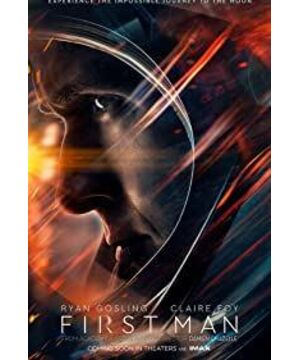I have been thinking, if the next step is the Chinese landing on the moon, how will our documentary films be made? Because just at the end of 2018, two events happened about the moon. One is China's Chang'e-4 landing on the moon, which is the first time a human probe has landed on the far side of the moon; the other is the film "First Man on the Moon", which shows the first human landing on the moon, which was released abroad and attracted attention among Chinese fans. This is a film based on the personal biography of American astronaut Armstrong. Facing the super grand theme of human landing on the moon, the film is unexpectedly presented from a personal perspective. In the film, Armstrong, as well as the impact and impact of his family on the moon landing, occupies more than half of the film. First of all, whether he can become the first person to land on the moon and whether he can successfully land on the moon is undoubtedly a once-in-a-lifetime temptation for every astronaut. From the perspective of personal struggle, the film shows Armstrong's efforts, sacrifices and As for the wife, she is more willing to accept a plain and stable family life than the most likely cost of landing on the moon, and what she desires more than the focus and political wrestling of all mankind is A husband who can come home every day, and a father of a child. The title of the film is "The First Man on the Moon". Indeed, the film is about people, their emotions and desires, their joys and sorrows, and because of this, this film is more real and can cross political, racial, and geographical boundaries. Divide, touch everyone on the planet.
The restrained and forbearing performance of "Commander High" is a highlight of the film. Armstrong was the first man on Earth to set foot on lunar land, but he was first and foremost a man. The death of his young daughter and the death of his colleagues due to the accident of the moon landing experiments were undoubtedly explosive, but his performance was calm. In the face of the huge mission and pursuit, his personal emotions were temporarily hidden. And when he really set foot on the land of the moon, the huge emotion in his heart was released.
"That's one small step for man, one giant leap for mankind". When humans land on the moon, there are many grand scenes that can be expressed, such as the erection of the American flag, scientific research sampling, and the spectacle of the lunar landform... In the movie, these scenes are all there, but they basically flash by, just like the widely discussed folks. The American flag, too, only gave a vision. In the longest scene on the moon, Armstrong gently dropped his daughter's bracelet into the crater. As the bracelet floated and fell lightly, the audience saw Armstrong's tearful face across the spacesuit. At a moment like this, politically and historically, he represents America and the planet, and personally, he's just an ordinary father.
This may not be the grandest moon landing, but it must be the most unforgettable. This may be the most personal, and it must be the most representative of the human heart.
View more about First Man reviews











